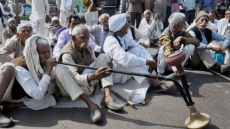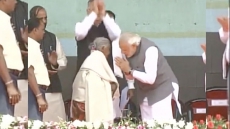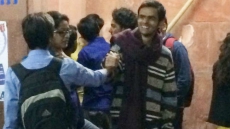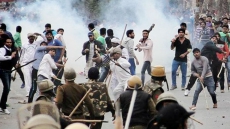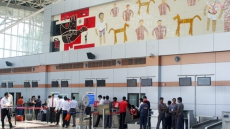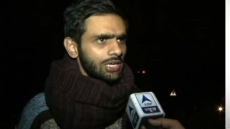Jawaharlal Nehru University vice chancellor M. Jagadesh Kumar on Monday assured the teachers' association that the administration will not allow police inside the campus, while Delhi Police Commissioner B.S. Bassi said the five students, who are facing sedition charges for allegedly raising anti-India slogans, should join the probe.
The decision not to allow police inside the campus came after a general body meeting between the JNU Teachers Association (JNUTA) and the vice chancellor, in which the teachers put forward five demands.
"The VC said he will respond to the points put forward in the meeting tomorrow (Tuesday). He also assured that police will not enter the campus," JNUTA general secretary Bikramaditya Choudhary said.
The decision came after five students accused of sedition surfaced in the campus late on Sunday evening. There was speculation that they may be arrested.
The five students -- Umar Khalid, Anant Prakash Narayan, Ashutosh Kumar, Rama Naga and Anirban Bhattacharya -- said they escaped and hid themselves fearing mob lynching and not police.
They had disappeared from the JNU campus after the February 9 event held to mark the anniversaries of executions of parliament attack convict Afzal Guru and Jammu Kashmir Liberation Front co-founder Maqbool Bhat.
JNU has been on the boil over the arrest of its students' union president Kanhaiya Kumar on sedition charges following the February 9 event. Anti-India slogans were allegedly raised at the gathering.
Bassi told reporters that the five students should join the probe and prove they are innocent.
"They (the students) should join the probe. If they are innocent, they should present evidence of their innocence," Bassi told reporters.
Asked if police would enter the JNU campus to arrest the students, Bassi said: "I am confident that my team is competent enough to deal with the matter."
"The investigating officer would take the best available option. The world is full of opportunities and options," he said.
"Police have proper evidence against the one who has been arrested, and in future too arrests will be made only after proper probe," Bassi added.
Khalid, who addressed students in front of the administration block of JNU late on Sunday evening, said he was "not a terrorist", adding that the BJP government "needed an excuse to target the campus".
"My name is Umar Khalid and I'm not a terrorist," he said, condemning the media trial that branded him a terrorist.
"The attack (on the university) is not because of the programme which was organised on Feburary 9, but because the government needs an excuse to attack us.

"The media, all this while, presented a lot of things about me. The media trial, this propaganda... I know what my family is going through," he added.
He refuted media reports that he made 800 calls to the Gulf or Kashmir a few days before the programme was organised.
A retired professor of JNU, meanwhile, came down heavily on the vice chancellor for letting the university plunge into an "unprecedented crisis" and said allowing police inside the campus was a "disaster" by him.
"Within two weeks of your taking over as vice chancellor of JNU, the university has been plunged into an unprecedented crisis over an event, which was not very unusual in JNU or any other university," retired professor Chaman Lal, who also studied in the university before becoming a faculty member there, said in a letter to Jagadesh Kumar.
"I really feel sorry for you, you should have known JNU better before accepting this challenge. It is better not to wear the shoes which does not fit one's feet," he said.
He also expressed surprise that as a guardian of Kanhaiya Kumar, Jagadesh Kumar has not uttered even a word on those "state protected black coated lawyers" who attacked Kanhaiya Kumar.
JNUTA's demands to the vice chancellor include disallowing police inside the campus, removal of the registrar, reconstitution of the committee to investigate the matter, dropping all charges of sedition and criminal conspiracy against students and release of Kanhaiya Kumar on unconditional bail.
SEDITION ROW REFLECTIVE OF INDIA'S DIVERSITY: US ENVOY RICHARD VERMA

The controversy over the sedition issue in Jawaharlal Nehru University just goes on to show how diverse India is, US Ambassador to India Richard Verma said on Monday.
Replying to questions after delivering a lecture on "Indo-US strategic partnership: Present status and future trends", Verma said diversity of spech and thought was one great hallmark of both the US and India.
"No country is more diverse than India. It is what will propel India in the next century," he said. "With diversity comes different viewpoints," he added.
